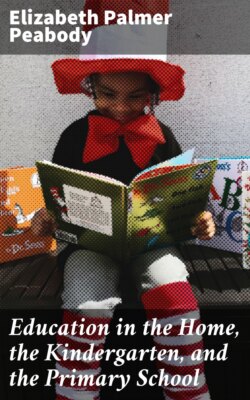Education in the Home, the Kindergarten, and the Primary School

Реклама. ООО «ЛитРес», ИНН: 7719571260.
Оглавление
Elizabeth Palmer Peabody. Education in the Home, the Kindergarten, and the Primary School
Education in the Home, the Kindergarten, and the Primary School
Table of Contents
INTRODUCTION
LECTURE I
LECTURE II
LECTURE III
LECTURE IV
LECTURE V
LECTURE VI
LECTURE VII
LECTURE VIII
GLIMPSES OF PSYCHOLOGY
SPIRITUALITY
UNDERSTANDING
MORAL SENTIMENT
INDIVIDUAL FREEDOM TO WILL
CONSCIENCE
APPENDIX
Note C, to Page 84
Note D, to Page 102
Note E, to Page 110
Note F, to Page 167
Footnote
Отрывок из книги
Elizabeth Palmer Peabody
Published by Good Press, 2021
.....
After a few years of this happy home and school life, which he continually reflected upon in contrast with what he had suffered for so many years, the good grandmother died, and he was sent back to his stepmother. The question now came up, whether he should study for the university, where his brothers had gone; but the stepmother, in the interest of her younger child, opposed his father's spending the money, and he went to a farmer to learn practical agriculture. But he was physically so incompetent to the labor of a farm life, that it did not pay; and being sent home by the farmer, he was finally apprenticed to a forester, where he found genial occupation in wood-lore, and in studying geometry for the purpose of surveying. Here he became a thorough and ardent mathematician. But his friend the forester died, or was removed, which brought this occupation to a premature close. At that moment, however, a maternal relation died, and left him a little money, so that he went to the University of Jena, where he devoted himself principally to the physical sciences; and by and by we find him curator of the Mineralogical Museum of Berlin. Here he made a great impression on the mind of a young lady who frequented the museum, by the "sermons" that he found "in stones," for he read them out to her, showing that in inorganic nature, so called, could be traced not only laws of decay, that threw into stronger light those laws of life that he had learned to see in vegetation, but those of crystallization. Everywhere he read God's revelation of the processes of life and death, which also make human development and happiness, or its deterioration and misery.
The trumpet call of patriotism, to rescue Germany from French despotism, made by the good Queen Louise of Prussia, called him from these peaceful studies to partake in the great national act of delivering his country; and he obeyed it by volunteering his service. Though his regiment was never called into battle, he always rejoiced in the effects upon himself of learning the military drill, as well as in the life-long friendships he made in camp. After the war was over, a legacy received at the death of his uncle Hoffman gave him the means to enter an architect's office, to which he had a great attraction. He was boarding at Frankfort-on-the-Main, where Middendorf and other of his late military friends were boarding, who had just engaged themselves as teachers in the city, waiting to perfect this arrangement. It was a moment when there was a great uprising of education in Germany, and that system was beginning to germinate, which has turned out to make Prussia the effective power in Europe that she has lately proved herself to be; and whose first principle is, that the primary is the most important stage of education. In connection with this general movement, there was about to be established a new school in Frankfort; and Grüner, its principal, who was one of the boarders, talked over with Frœbel and the others the new plan. Whatever Frœbel said was so striking and vital, that Grüner at last exclaimed: "Plainly this is your vocation! Give up the architecture, and come in with us, and help to build men." Strange to say, though Frœbel had all his life been meditating upon the secret of human education, this was the first time it occurred to him to make it his own business. The more he thought of Grüner's suggestion, the more he liked it; and the issue was, that he took one of the younger classes in the new school. Immediately afterwards he wrote to his brother that at last he had found his element—he "felt like a bird in air, a fish in water." But the teachers were hampered in their action by the proprietors of the school; and after a season Grüner said to Frœbel, "You should lead; not be led. I release you from your engagement. Set up independently, and carry out your own ideas unhindered."
.....